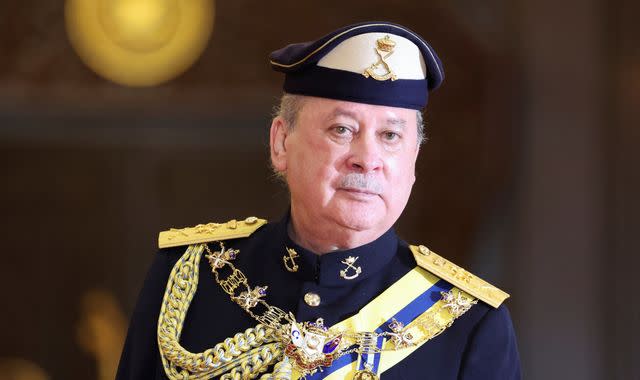New King of Malaysia sworn in under country's rotating monarchy system

The billionaire sultan of Johor state has been sworn in as Malaysia's new king under the nation's unique rotating monarchy system.
Sultan Ibrahim Iskandar, 65, took his oath of office at the palace and signed the instrument of the proclamation of office in a ceremony witnessed by other royal families, Prime Minister Anwar Ibrahim, and cabinet members.
A coronation ceremony will be held at a later time.
Under the unique system, the heads of Malaysia's nine royal families take turns to be the King, known as the "Yang di-Pertuan Agong" every five years.
Known for his large collection of luxury cars and motorbikes, Sultan Ibrahim has wide-ranging business interests from real estate to mining, including a stake in Forest City - a £79bn China-backed land reclamation and development project off Johor.
The new monarch has close ties with Anwar, and his rule could bolster the prime minister's united government, which faces strong Islamic opposition.
Ahead of his installation, Sultan Ibrahim told Singapore's The Straits Times newspaper he intends to be an active monarch and proposed that Malaysia's state oil firm Petroliam Nasional and the country's anti-corruption agency should report directly to the King.
He also spoke of his plans to revive a stalled high-speed rail link project between Malaysia and Singapore, with a border crossing through Forest City.
Prime Minister Ibrahim later downplayed the statements, saying all opinions can be discussed without disregarding the federal constitution, state media reported.
Sultan Ibrahim takes on his duties as King amid renewed political tensions in Malaysia.
The country has seen ongoing political turmoil since 2018 when the then-ruling Barisan Nasional coalition was ousted from power for the first time since independence, prompting the monarch to play a greater role.
Nine ethnic Malay state rulers have taken turns as King for five-year terms under the world's only such system since Malaysia gained independence from Britain in 1957.
Sultan Ibrahim's election to the national throne by his fellow rulers in October was widely expected based on an established rotation order.
Sultan Nazrin, the ruler of Perak state and next in line to the throne, was re-elected as deputy monarch.


